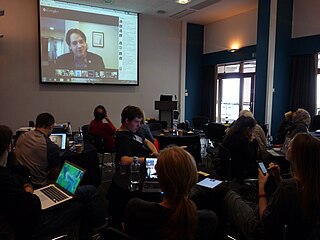
This post was written by Chris McKenna of the Wikimania support team
The Wikimania 2014 fringe programme kicked off with a successful first event on the 24 and 25 of May when the Barbican centre played host to a weekend of discussion about Social Machines.
The event featured a teleconference with Philippe Beaudette, the director of Community Advocacy at the Wikimedia Foundation.
Social machines are the interaction between humans and machines that produce output that would not be possible without both of them – Wikipedia is a large example. Discussions at the largely free-form event ranged over a broad variety of topics and included the granularity of Wikimedia projects and how both the whole and several portions can each be regarded as a social machine.
Also discussed were the many emergent aspects of Wikipedia – things that have organically grown up within and around the encyclopaedia rather than being planned. Examples include WikiProjects, the Signpost internal newspaper, chapters and thematic organisations, edit counters, Wikimedian associations such as inclusionists and deletionists, the various WikiFauna like trolls, gnomes and giants and real-word meetups.
Structure to the event was provided by the teleconferences with several key people in the Wikimedia Foundation:
- Brandon Harris, Senior Designer
- Philippe Beaudette, Head of Community Advocacy
- Fabrice Florin, Product Manager
- Jessie Wild, Global Learning & Evaluation
- Aaron Halfaker, Resident Research Scientist
The thing that most sticks in my mind from the event came from Philippe’s introduction to his Community Advocacy department when he noted that they deal with around 60 threats from people to harm either themselves or others. While most of those are fortunately blatantly false, Wikipedia is responsible for directly and indirectly saving lives.
The rest of the fringe programme should be just as good, if not better, than this event so come along and get involved.





